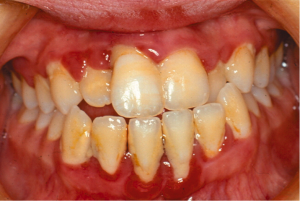Gum problems are often split into two categories: Gingivitis (gum disease) and periodontal disease.
Gingivitis is simply inflammation of the gums. It is primarily due to plaque build up and its effects are completely reversible with improved oral hygiene.
 When brushing diseased gums, there is a tendency for bleeding. Many patients fear they have done something wrong when they see blood and subsequently avoid brushing the area again. It is the extreme opposite approach that is required. When an area bleeds, return to the area and brush more thoroughly and allow the bleeding to continue. This approach over a few days will cause the bleeding to cease.
When brushing diseased gums, there is a tendency for bleeding. Many patients fear they have done something wrong when they see blood and subsequently avoid brushing the area again. It is the extreme opposite approach that is required. When an area bleeds, return to the area and brush more thoroughly and allow the bleeding to continue. This approach over a few days will cause the bleeding to cease.
Periodontal disease is where gingivitis has been left untreated and the condition has progressed to an irreversible state. Although techniques are present to stabilise periodontal disease, some permanent damage has been done to the supporting structures of the teeth.
Unfortunately, the teeth are only as strong as the foundations holding them in place.
Periodontal disease characteristically involves bone loss from around select teeth, and can present either localised or generalised. Regular dental hygiene visits are required to stabilise the condition, in conjunction with meticulous oral hygiene and interdental brush use daily.

If your gums bleed when brushing, speak to your dentist! Detect problems in the reversible gingivitis stage prior to the difficulty progressing to irreversible bone loss.
To arrange an appointment, feel free to call our reception team on 0114 2377642 or pop in during our normal working hours.
You are now welcome to book your NHS dental assessment for patients aged under the age of 18 only, or organise a New Patient Assessment for adults which costs £65 including any X-rays that are required. Contact us on 0114 2377642 for further information.